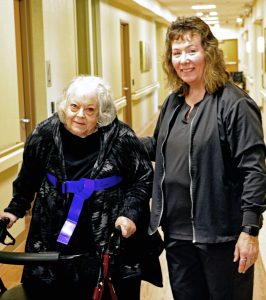
Studies have shown up to 60% of adults aged 65 years or older lose their ability to independently ambulate or walk during a hospital stay. But a Wisconsin Hospital Association program that is being used at Tomah Health is changing those numbers.
“The WHA MOVIN program certainly has made a difference for our staff and patients,” said Tomah Health Acute Care director Jessye Buswell. “We know that progressive ambulation is important because it can prevent in hospital falls. It can reduce readmissions like weakness related readmissions, and it can also potentially reduce the need for discharge to a skilled nursing facility,” Buswell said of the program which was implemented in May.
Ambulation is the ability to walk from one place to another, with or without assistive devices. It is most often used when describing the goals of a patient after a surgery or physical therapy. To reach a patient’s goal of ambulation, they may require assistance before they are able to walk around on their own, which Buswell said is an important part of care at Tomah Health. “Progressive ambulation is an important part of a patients care plan, and it’s an intervention that is used to prevent in hospital decompensation, but it’s definitely something that’s often overlooked,” said Buswell.
MOVIN, which stands for Mobilizing Older adults Via a systems-based Intervention, was designed by Dr. Barbara King and Dr. Linsey Steege, two associate professors at the UW Wisconsin – Madison School of Nursing to address the fast onset of physical decline in older adults caused by prolonged periods of bedrest, as well as to address barriers that prevent nursing staff from getting patients up and mobile.
WHA began partnering on MOVIN to promote and support its implementation in Wisconsin hospital settings. “This program is a win-win for our hospitals. It builds nursing staff confidence in their psychomotor skills and creates a reliable environment that allows for time to get patients up and moving,” said WHA Quality Director Jill Lindwall MSN, RN, CPHQ. “It also takes a patient centered approach by engaging patients to set and meet mobility goals during their hospitalization. The positive impact this is having on patient care is evident.”
Since May when Tomah Health began collecting data, staff has logged just over 110 miles of ambulation with patients, which Buswell said is significant. “It is significant because we have patients that come here that are unable to ambulate at all. So we’re starting with essentially baby steps. It might be a pivot transfer with assistance, could be a ceiling lift and to get them to where they’re able to walk into the hallway is a significant accomplishment.” Buswell said hospital staff includes two certified Ambulation Aides who have focused directly on getting patients moving. “Prevention as medicine, is something that is rewarding for any staff in the health care field, so I think we are able to do that in an acute setting by focusing on mobility,” said Buswell. “Our staff, working directly with physical therapy, allow us to have the latest and greatest information on how best and safely to mobilize our patients.”
Tomah resident Jackie Flock said the program has been a life changer. “When I came in, I was pretty sick and not mobile at all and actually needed assistance. I think I walked 180 feet. I’ve made a lot of progress,” said Flock. She said the program has been an inspiration for her. “I think it’s amazing. Anytime I have a challenge, I’m going to show I can do it. I’m not going to let somebody tell me I can’t do it. So, it pushed me,” Flock explained.
Buswell said Flock’s outcome is the ultimate objective of the program. “With the dedication of our staff focusing on getting her moving at least three times per day, we were able to progress her mobility such that she was able to transition to her home setting as opposed to requiring more significant care which is ultimately the goal for most people,” added Buswell.
Ambulation is important for people, especially the elderly, even without surgery since inactivity reduces muscle mass, strength, and reduces the oxygen capacity in the blood. As muscles begin to feel stiff and sore, movement progressively becomes more difficult and painful. For these reasons, ambulation is an important daily goal for all ages. “It really becomes a culture of acute care now and is part of the treatment patients will receive when they come to Tomah Health and are hospitalized,” explained Buswell. “It’s going to be an important part of everybody’s care plan.”
 As Wisconsin’s population continues to age, Lindwall said the demand for hospital and health services is growing. Average lengths of hospital stays have been on the rise and hospitals struggle to find post-acute care placement for patients ready to leave the hospital but unable to return home. “Programs such as MOVIN® can have a meaningful influence on maintaining older adults’ function and independence while in the hospital and is a great example of innovative high-quality care in Wisconsin.”
As Wisconsin’s population continues to age, Lindwall said the demand for hospital and health services is growing. Average lengths of hospital stays have been on the rise and hospitals struggle to find post-acute care placement for patients ready to leave the hospital but unable to return home. “Programs such as MOVIN® can have a meaningful influence on maintaining older adults’ function and independence while in the hospital and is a great example of innovative high-quality care in Wisconsin.”
Flock concurs with the aim of the program. “I have nothing but good things to say about the care I receive. I just couldn’t ask for better care,” said Flock. “This hospital is filled with amazing people and I’m grateful.”